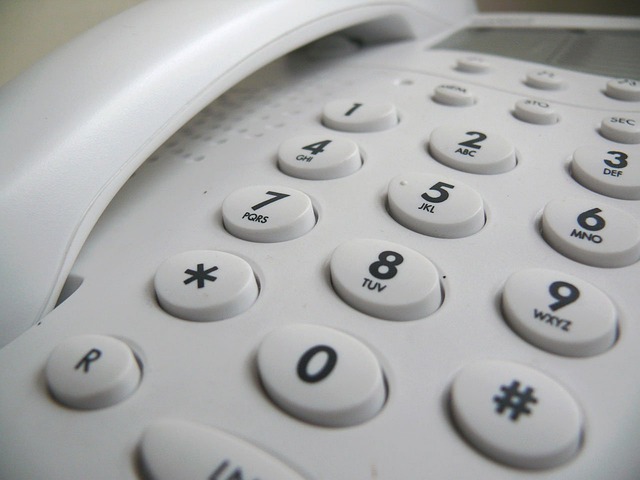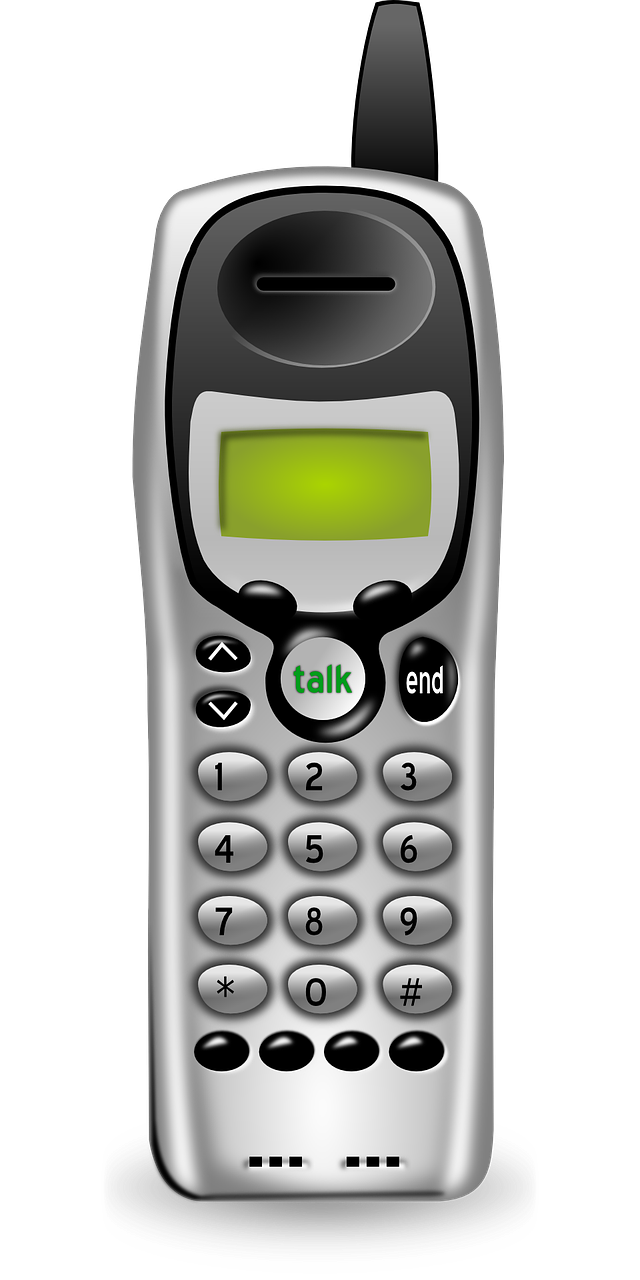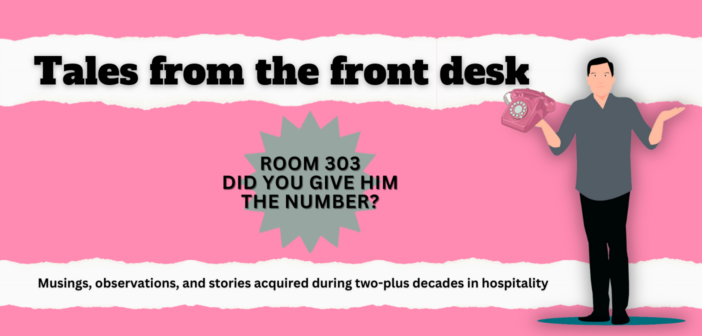PART OF AN ONGOING SERIES EXPLORING THE (SOMETIMES) LIGHTER SIDE OF A LIFE SPENT WORKING IN A HOTEL. READ EARLIER INSTALLMENTS HERE.
by DEVEN MATTHEWS
The size of a hotel is determined by the number of guestrooms on the property. The response to the question “How big is your hotel?” would never be in square footage or number of floors. Rather, the answer is the number of guestrooms contained in the hotel. This informs the curious party of the physical size of the property and approximately how many associates the hotel employs. More specifically, the size of the hotel directly determines the size of the front desk and the number of front desk agents on duty.
Generally, in midsize hotels, which range from 120 to 200 guest rooms, two people at the front desk is sufficient. During the graveyard hours, one person is adequate to operate the hotel efficiently. The hotel needs enough employees to meet the needs of the guests, but not so many that associates are standing around twiddling their thumbs. As with every business, budgeting salaries must be considered to maximize profits.
In my hotel of 150 rooms, there were two of us at the desk during this shift, my colleague Josh and me. It was approximately 1 p.m., and we were going about the business of the day. Josh and I got along pretty well, so in between taking care of the guests we would converse and enjoy one another’s company.
 The phone rang and Josh answered it being that he was in closer range. He was a pro at reciting the scripted answer while sounding genuine.
The phone rang and Josh answered it being that he was in closer range. He was a pro at reciting the scripted answer while sounding genuine.
“Good afternoon. Thank you for calling the front desk, this is Josh. How may I help you?”
There was a brief pause, followed by Josh stating, “Certainly, I’ll be happy to transfer you. One moment, please.”
He pushed a few buttons on the phone and then hung up the receiver. I thought nothing of the phone call and went about my duties as normal.
About 30 seconds later, the phone rang again. Josh was still physically closer to the phone than I, so he reached down and answered.
“Good afternoon. Thank you for calling the front desk, this is Josh. How may I help you?”
There was another brief pause, after which Josh responded, “No problem, sir, it’s my pleasure. I will transfer you to room 301.”
With the press of a few buttons, he hung up the phone.
Curiosity got the best of me, and I asked, “What was that all about?”
Josh responded, “Some guy who called and asked for room 300 a second ago, but he got the room number wrong. That was him again correcting his mistake.”
“Well,” I replied, “I hope he finds who he’s looking for.”
COMMUNICATIONS CENTRAL
 In the days prior to cell phones, the hotel’s front desk telephone was a beehive of activity. Phone calls would come day and night from people looking for guests. After the widespread adoption of cell phones, however, the main telephone is rarely used except by the front desk staff calling out to guest rooms. This translated into good news for the front desk agent who now experiences fewer interruptions during their shift.
In the days prior to cell phones, the hotel’s front desk telephone was a beehive of activity. Phone calls would come day and night from people looking for guests. After the widespread adoption of cell phones, however, the main telephone is rarely used except by the front desk staff calling out to guest rooms. This translated into good news for the front desk agent who now experiences fewer interruptions during their shift.
My thoughts were interrupted by the ringing telephone at the front desk. Once again Josh picked up the phone and recited the scripted greeting.
“Good afternoon. Thank you for calling the front desk. This is Josh, how may I help you?”
There was a brief pause and Josh replied through a polite laugh, “Sure, it’s no problem.” Once again, with the press of a few buttons on the telephone, Josh set down the receiver.
“That was the same guy,” Josh said to me. “He’s really lost. This time he said he thinks his friends are in room 303.”
I continued my work not thinking very much about the phone calls. People mistake room numbers all the time. They may ask for room 421 when in reality they’re looking for room 412. People may ask for room 314 when their party is really into 214. Mistakes will happen.
Unfortunately, Josh had just made a grave mistake with this particular set of phone calls.
He had stepped into the back office for just a moment to retrieve something from the printer when the phone then rang again. I picked up the receiver while my caller ID screen notified me that that was an internal call.
It was the guest in room 303.
“Front desk, this is Deven. How can I help you?”
The man’s voice was very timid, as if he had just committed a felony, and I could sense fear in his voice. “Did you just call me and ask for my credit card number?”
His question took me completely by surprise. “I’m sorry?” I replied.
“Somebody just called my room and said he was you at the front desk. He asked me for my credit card number because there was some sort of problem. Was that you?”
With panic in my voice, I quickly spit out, “Did you give him the number?”
After a brief pause, the guest replied, “Yes.”

VIGILANCE IS A VIRTUE
Con artists pose a threat to any industry. The hotel industry is somewhat vulnerable based on the amount of credit card numbers stored at the front desk. Prior to relatively recent technological advances, the front desk would take a physical imprint of each guest’s credit card and keep it in a file box at the front desk. Imagine the danger if that box was stolen? Likewise, imagine the mega hotels with up to 5,000 guest rooms – you can imagine the number of credit card numbers they had sitting in that file.
Fortunately, technology has improved. No longer does the front desk agent take a physical imprint of every card. Instead, the card is swiped through a machine and the information is stored digitally. Furthermore, once the card is in the system, Xs replace the numbers on the card except for the last four digits. This adds a layer of security to the guest so their card number won’t be compromised.
In the case of the guest in room 303. He blatantly read the card number to the imposter on the phone who was impersonating a front desk agent.
I quickly sprang into action. “Sir, that wasn’t us. Hang up with me and call your credit card company immediately. Cancel that card.”
There was a click on the other end of the line while the guest then sprang into action himself.
Josh then returned to the desk, and I relayed it to him what just transpired. He was sympathetic and then realized the severity of what had happened.
“I didn’t do anything wrong, did I?” Josh asked.
Technically, he hadn’t. He did not disclose the guest’s credit number; the guest volunteered the information himself. However, Josh didn’t aid in protecting the guest either.
Clearly this con artist called the hotel asking for random room numbers. He got lucky on the third try and found a gullible guest willing to fall for his scam. Had Josh been more inquisitive and screened the call, the con artist would never have gotten access to our guest.
I saw this as a training moment for Josh. “Next time, verify the last name on the room before you transfer the call.”
Josh’s eyebrows both rose, and a look of contemplation overcame his face. “Ah, that makes sense.”
Just then, the guest from 303 rounded the corner to the lobby and headed towards the desk. His look of anger was prominent.
“Which one of you morons sent that phone call to my room?”
Josh and I looked at each other and Josh said, “I did, sir.”
Room 303 continued. “Oh, OK. Great! And on what planet were you trained that giving out my credit card number to some scammer was okay?”
I could tell Josh was taken back. He managed to stammer out an “Uh…” when I decided to throw him a life preserver.
“Sir, Josh was just following policy. When someone calls the hotel asking for a guest room, we immediately transfer the call. The man you spoke to asked for room 303, and Josh transferred the call; he was just doing his job.”
Room 303 was not amused at my explanation. He glared at me. I went on with the explanation.
“Additionally, Josh did not disclose your credit card information. You volunteered that information on your own.”
You could tell he had been beat and was fighting the embarrassment. He was silent, searching for some way to shift blame our direction. If room 303 was in a more rational state of mind, he would have realized he was angry at the situation and not at Josh. But rational was not high on his current emotions.
I continued. “The front desk of any hotel has been trained to never seek sensitive information such as credit card numbers over the telephone. Moving forward, should this occur again, never disclose your information over the phone. Rather, come down to the desk to secure the validity of the phone call.”
I could tell room 303 was defeated. The guest was embarrassed and realized his wrongdoing. He looked at Josh and walked a step closer to him. He pointed his thin, trembling finger in Josh’s face, and vocalized the infamous threat that has been announced myriad times from angry guests across the globe.
“I’ll have your job for this!”
NOT-SO HAPPY TRAILS
Guests get angry with the front desk staff on occasion, and nine times out of 10, it’s no fault of the hotel. It boils down to the guest not getting what they feel they deserve. This holds true in the case of wanting an undeserved discount or connecting rooms. Room 303 stormed off, mumbling negative comments and empty threats under his breath. He stopped about 15 yards from the front desk and lamented his final blow.
“I am NEVER staying at this hotel EVER again!”
With that, room 303 turned and left. We didn’t hear from him for the duration of his stay and from what I know, he never did return to our hotel again.
 Deven Matthews is a hotelier who has worked in the hotel industry for more than 23 years. A professor of hotel management at the College of Southern Nevada in Las Vegas, Deven enjoys instructing the future managers of Las Vegas hotels. He holds a master’s degree in business management and is fascinated by all things hospitality. When not immersed in hotels, Deven enjoys playing the piano and spending time with his wife and their six children.
Deven Matthews is a hotelier who has worked in the hotel industry for more than 23 years. A professor of hotel management at the College of Southern Nevada in Las Vegas, Deven enjoys instructing the future managers of Las Vegas hotels. He holds a master’s degree in business management and is fascinated by all things hospitality. When not immersed in hotels, Deven enjoys playing the piano and spending time with his wife and their six children.




